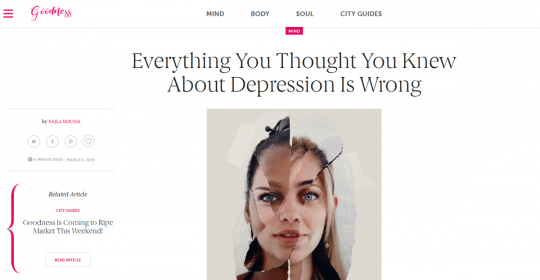
5 Myths About Depression Debunked – Dubai Psychologist Dr. Harry Horgan feat. In Goodness Magazine
“It’s all in your head.” , “You’re just sad.”, “Cheer up!”, “You have so much to be grateful for.” People suffering from depression hear such comments regularly. Whether from well-intentioned family and friends or from acquaintances, the general consensus is that depression will disappear if the person in question just tries a little harder to appreciate their life, be more optimistic, and perhaps spend more time doing the things they love. […]
But they’re wrong. Below are a few myths about depression that we’ve debunked, with the help of professionals. […]
Myth #1: You can think yourself out of depression.
Dr. Harry Horgan, Psychologist at the German Neuroscience Center (GNC) in Dubai, agrees; “The neurobiology of depression is still not well understood. Hence, it can be difficult to identify and challenge or change a negative thinking process.” Bottom line: You can’t think yourself out of depression. […]
Myth #2: Depression is caused by something.
While certain traumatic experiences in life can trigger depression, there is no real reason or justification for it. It just is. “It can happen ‘out of the blue’, as they say, because some people are biologically vulnerable to depression. It could be genetic, or it could be due to a physical condition like hypothyroidism. […]
Myth #3: Depression is a female problem.
This common belief is not only inaccurate, but it’s also a dangerous way of thinking because it dissuades males with depression from coming forward and seeking help. “Of the people that report experiencing depression, approximately 60 percent are women and 40 percent are men. So, while there may be a difference between the sexes, this discrepancy is partly due to the difference in help-seeking behavior, as men are often less likely to seek support for a range of health conditions,” says Dr. Horgan.[…]
Myth #4: Being sad is the same as being depressed.
Because pervasive sadness is one of the main symptoms of depression, people often can’t tell the difference between the two. “While persistent sadness is often part of the experience of depression, it’s not only the case. Depression is not an increase of sadness, but rather a flat-lining of all emotions,” Dr. Horgan says.
Myth #5: Being grateful makes you less depressed.
While studies have proven that practicing gratitude greatly impacts our mental, physical, and psychological wellbeing, telling a depressed individual to be more grateful is, in fact, unhelpful. Firstly, it assumes that people with depression are in control of their feelings – they are not. Secondly, it increases their feelings of guilt, which ultimately discourages them from seeking help. Thirdly, it perpetuates the stigma of depression and misconstrues the real causes behind it. Simply put, telling a depressed person that they should be more grateful shows a serious lack of understanding about this mental health illness and is dismissive of the struggles someone with depression goes through on a daily basis. […]
The full original article was published in Goodness

